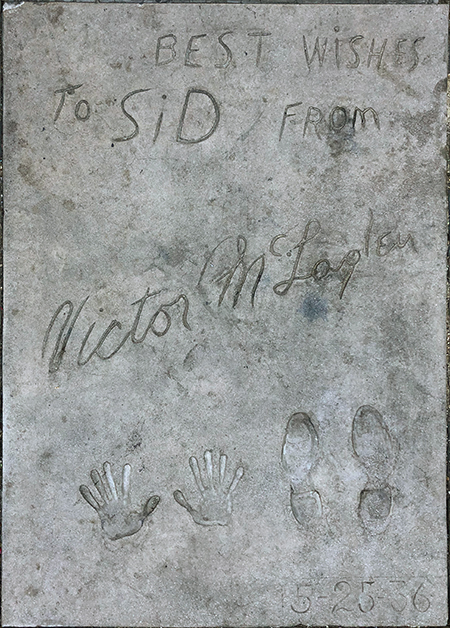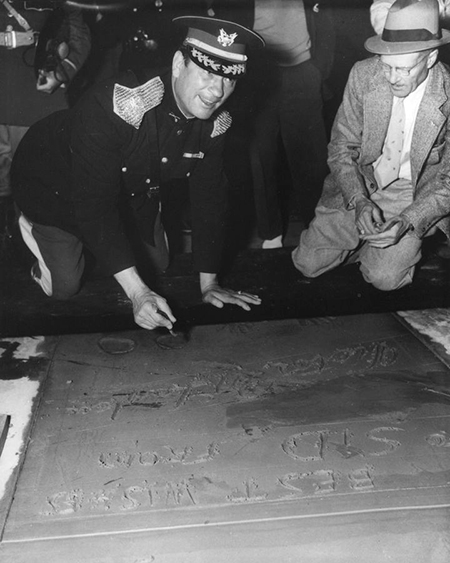 |
 |
|
|
| Victor McLaglen |
 |
| Forecourt Ceremony held on Monday, May 25, 1936 |
| |
Born: Victor Andrew de Bier Everleigh McClaglen, December 10, 1886, in Stepney, East London, England
Age at the time of the ceremony: 49
Died: November 7,1959, in Newport Beach, California, age 72 |
| |
One of the great personalities in film history, Victor McLaglen became a superstar in the late silent period, headlined in many pictures during the 1930s, and settled down to become one of the most memorable supporting players in his later career. Once you encounter this fellow, you'll not forget him, laddie.
Born into a large family, Victor's father, a Protestant clergyman, accepted a post in South Africa, where young Victor grew up. At 14 and wishing to serve in the British Army during the Second Boer War, Victor was posted at Windsor Castle instead; he was sent home when his true age was discovered.
McLaglen became a wrestler and boxer after moving to Canada. He also toured in a circus, offering $25 to anyone who could fight three rounds with him. He enlisted in World War I, becoming a captain, serving in the Middlesex Regiment; he later became the Assistant Provost Marshall during the British occupation of Bagdad. McLaglen became the heavyweight champion of the British Army in 1918. When the war ended, McLaglen began to appear in British silent films.
By the 1920s, McLaglen had moved to Hollywood. It didn't take long for him to become a popular figure in the silent era. He scored a huge hit with the Lon Chaney film The Unholy Three (released in August 1925), and co-starred with Edmund Lowe in What Price Glory? (released in November 1926). McLaglen would make several films with Lowe, playing his Glory character, Captain Flagg: The Cock Eyed World (which played the Chinese in September 1929), and Women of All Nations (which played the Chinese in May 1931), and Hot Pepper (released in January 1933). They also appeared together in Guilty as Hell (released in August 1932), No More Women (released in March 1934), Under Pressure (released in February 1935), and The Great Hotel Murder (released in February 1935).
Once director John Ford set up shop at R-K-O, McLaglen was called in to play the lead in The Lost Patrol (released in February 1934). They had worked together before, in Mother Machree (released in January 1928), Hangman's House (released in May 1928), and The Black Watch (released in May 1929), while at Fox. Their great masterwork remains The Informer at R-K-O (released in May 1935), which demonstrates McLaglen's incredible acting ability — all seemingly self-taught. He received an Oscar for this film.
McLaglen played with Ronald Coleman and Claudette Colbert in the 1936 version of Under Two Flags; while the film played the Chinese, McLaglen made his imprints. No one seems to know why he wore a military uniform (perhaps he was shooting something at the time).
The list of must-see McLaglen films is practically endless, but some of the notable ones are: Wee Willie Winkie with Shirley Temple (which played the Chinese in September 1937), Gunga Din with Cary Grant and Douglas Fairbanks, Jr. (released in February 1939), The Foxes of Harrow with Rex Harrison and Maureen O'Hara (played the Chinese in October 1947), Fort Apache with John Wayne and Henry Fonda (released in March 1948), She Wore a Yellow Ribbon with John Wayne (released in October 1949), and Rio Grande with John Wayne and Maureen O'Hara (released in November 1950).
McLaglen, John Wayne, Maureen O'Hara and director John Ford would all get together and make the classic The Quiet Man (released in September 1952); McLaglen plays the intractable heavy in this wonderful film — do yourself a favor and see it.
During the early CinemaScope era, McLaglen kept busy. He starred in Prince Valiant with James Mason and Janet Leigh (which played the Chinese in April 1954), Trouble in the Glen with Orson Welles (released in December 1954), Bengazi with Richard Conte and Richard Carlson (released in September 1955), City of Shadows (released in June 1955), Lady Godiva of Coventry with Maureen O'Hara in the title role (released in November 1955), Around the World in 80 Days (released in October 1956), The Abductors (released in July 1957), and Sea Fury (released in August 1958).
McLaglen did a number of television shows: Schlitz Playhouse (1952), Lux Video Theatre (1954), The Eddie Cantor Comedy Theatre (1955), Jane Wyman Presents The Fireside Theatre (1955), Have Gun - Will Travel (1958), and Rawhide (1959). You could say that McLaglen acted until he stopped: he just had a heart attack one day and that was it. He was 72. |
|
|
|
|
| |
 |
 |
| Grauman's Chinese Theatre, Hollywood, California. Victor McLaglen Forecourt block. Executed by Jean Klossner, Monday, May 25, 1936. 41 x 67 inches. |
 |
 |
 |
| Grauman's Chinese Theatre, Hollywood, California. Victor McLaglen Forecourt ceremony, Monday, May 25, 1936. Victor McLaglen is assisted in making his imprints by cement artist Jean Klossner. |
|
|